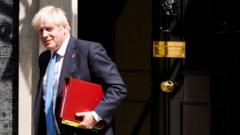Official records recently brought to light are prompting significant scrutiny regarding the nature of political funding within the UK. Files from No 10 Downing Street indicate that a foreign billionaire, who reportedly met with then-Prime Minister Boris Johnson at the official residence, was specifically identified in an internal log as a “donor.” This categorization in government documentation has ignited debate and raised pertinent questions concerning the legality of certain donations made to the Conservative Party, as well as the broader adherence to established regulations for political contributions.
The designation of a non-UK national with significant wealth as a “donor” in official governmental records, particularly in connection with high-level meetings, has drawn attention to the stringent rules governing the sources of funding for political parties. UK legislation typically outlines clear parameters for acceptable donations, often restricting contributions from foreign entities or individuals without a strong UK connection, to ensure transparency and mitigate against external influence. The surfacing of these details from Downing Street files has therefore led to calls for clarification on whether such interactions and any related financial contributions fully comply with the existing legal framework. Observers are now examining whether the procedures and classifications outlined in these records align with the spirit and letter of laws designed to safeguard the integrity of the UK’s political funding system.



